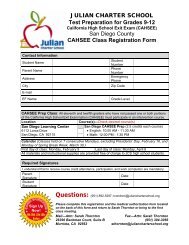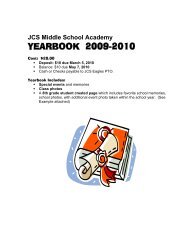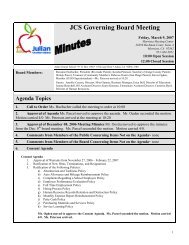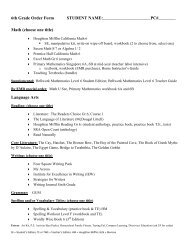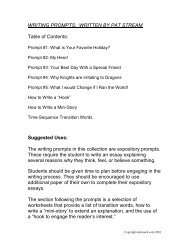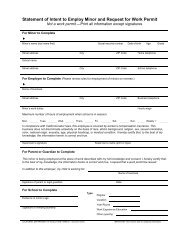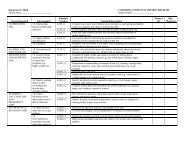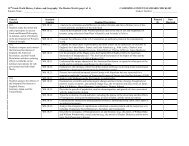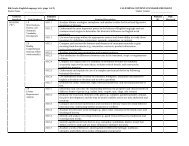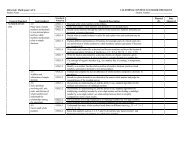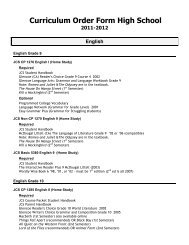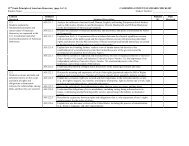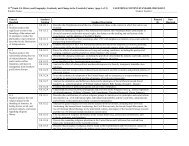2009-2010 Self-Study WASC Action Plan - Julian Charter School
2009-2010 Self-Study WASC Action Plan - Julian Charter School
2009-2010 Self-Study WASC Action Plan - Julian Charter School
Create successful ePaper yourself
Turn your PDF publications into a flip-book with our unique Google optimized e-Paper software.
• Students think, reason, and problem solve in group<br />
and individual activities.<br />
• Discussions and class wikis<br />
• Student-created rubrics<br />
• <strong>Self</strong> and group assessments<br />
• Writer’s workshops and peer editing<br />
• Students use technology.<br />
• Student-created PowerPoints<br />
• Use of wikis, blogs, and Google apps<br />
• Use of Photo Story and video production<br />
• CompassLearning Odyssey<br />
• Online courses: Spanish III, Digital Citizens Unite,<br />
Algebra Support (and tutoring), CLO high school<br />
courses, Discovery Streaming<br />
• Students use materials and resources and construct<br />
learning beyond the textbook.<br />
• Résumé writing<br />
• Current events (newspapers and media)<br />
• Students participate in job shadowing<br />
• Assorted field trips<br />
• Vendor Course Instruction<br />
• Internships and work experience<br />
• Enrollment in community college/ROP classes<br />
• Participation in SPAWAR – Girl’s Day Out, BE WiSE<br />
(San Diego Science Alliance), and Civil Air Patrol<br />
• Service learning projects<br />
• Goals for Linking Instruction and Assessment:<br />
• Feedback on mastery is timely and geared toward<br />
individual learning styles<br />
• Teachers monitor progress and adjust instruction<br />
(curriculum, strategies, gaps, tools, scaffolding)<br />
• Ongoing formative assessment involves students<br />
in the evaluation of their own learning and goal<br />
setting<br />
• Teachers work as coaches to facilitate learning<br />
• Rubrics are provided when work is assigned<br />
• Student progress in mastering core subjects and<br />
21st century skills is measured over time through a<br />
comprehensive, balanced assessment approach<br />
(e.g., formative, benchmark, summative and/or<br />
large-scale assessments)<br />
• Capstone projects, portfolios, and performancebased<br />
work products are used to formatively<br />
assess student performance<br />
• English class wikis<br />
• Rubric for human body 3-D<br />
model<br />
• Spanish self assessment<br />
• Writing workshop peer<br />
editing sheet<br />
• Student work sample of<br />
science project<br />
• English and science wikis<br />
and websites, K-8 projects<br />
• Elluminate schedule<br />
• Classroom observation<br />
• WIGS <strong>2009</strong>-<strong>2010</strong><br />
• English and life skills<br />
assignments, social studies<br />
current events project,<br />
ROAR week (MA)<br />
• Field trips to colleges, Salk<br />
Institute, sheriff substation<br />
• Master agreements<br />
• Refugee tutoring program<br />
(AA), native plant revegetation<br />
project (PVA)<br />
• Learning Styles<br />
• Goal setting sheet<br />
• Rubrics<br />
Chapter 4: <strong>Self</strong>-<strong>Study</strong> Findings: Instruction<br />
74 <strong>Julian</strong> <strong>Charter</strong> <strong>School</strong> Focus on Learning <strong>2009</strong>-<strong>2010</strong>



